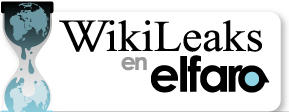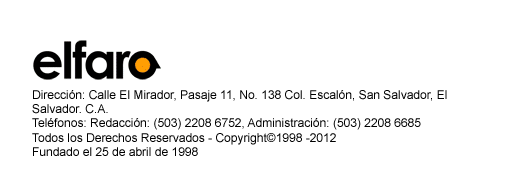TERRORISM FINANCE COORDINATING OFFICER (TFCO) AND ACTION PLAN
Publicado el 28 de Junio de 2011
id: 42611
date: 10/13/2005 16:39
refid: 05SANSALVADOR2796
origin: Embassy San Salvador
classification: UNCLASSIFIED//FOR OFFICIAL USE ONLY
destination: 05STATE175637
header:
This record is a partial extract of the original cable. The full text of the original cable is not available.
----------------- header ends ----------------
UNCLAS SECTION 01 OF 02 SAN SALVADOR 002796
SIPDIS
SENSITIVE
STATE FOR EB/ESC/TFS - JCLARK AND S/CT - TKUSHNER
STATE ALSO FOR INL/C/CP - SPETERSON AND IO/PSC - BFITZGERALD
TREASURY FOR OFAC - P LURIE
E.O. 12958: N/A
TAGS: PTER, KTFN, KVPR, EFIN, ETTC, PREL, ES
SUBJECT: TERRORISM FINANCE COORDINATING OFFICER (TFCO) AND
ACTION PLAN
REF: A. STATE 175637
B. STATE 145310
1. Post is pleased to provide the following information,
keyed to Ref. A requests, on coordination of efforts to
combat terrorism financing:
a. TFCO: Jessica Webster, Economic Counselor, 503-2501-2050,
b. Deputy TFCO: David Krzywda, Economic Officer,
503-2501-2050, [email protected]
c. Publication of a list of TFCOs and Deputy TFCOs by region
on the Department's classified website would be useful to
improving coordination among TFCOs. Publishing success
stories on the website that describe how TFCOs, working with
host governments, have thwarted terrorism finance would also
be useful, especially in communicating the importance of the
issue to host-government officials.
d. Post's Action Plan for Combating Terrorism Financing in El
Salvador, which follows in Paragraph 2, includes actions to
engage a variety of audiences on terrorism finance related
issues (Ref. B).
e. Washington agencies' support for post's efforts on
combating terrorism financing is excellent; however,
consistently providing same-day translations of designations
would improve the speed with which we can notify our host
government and request assistance in investigations.
2. Begin Text:
Combating Terrorism Financing in El Salvador
An Action Plan
U.S. Embassy, San Salvador
Combating Terrorism Financing Working Group:
DCM, ECON, POL, DEA, Legatt, ICE, INL, ORA, PAO, USAID
Because the Islamic community in El Salvador is small, and
charities or other mechanisms to collect funds are not well
developed, there is a low risk that Islamic terrorists will
use El Salvador as a site for significant fund raising. To
date, El Salvador has not identified, frozen, or seized any
assets under UNSCR 1267 or 1373. However, we believe there is
some risk that other terrorists, particularly of Latin
American origin, will use El Salvador as a site to launder
drug money, possible for terrorism financing. The volume of
cash that flows through remittances and the freedom of moving
money into El Salvador's dollarized economy make it an
attractive environment. For example, the Salvadoran police
(PNC) recently arrested a Panamanian national for allegedly
laundering $75,000 a day through Salvadoran wire transfer
companies since March of 2004.
El Salvador's money laundering law provides a legal basis for
freezing and seizing proceeds from illegal activities but
does not regulate the flow of legitimate money to terrorist
organizations. Nonetheless, the Government of El Salvador
(GOES) has been largely cooperative on investigating the
names and organizations on all USG-provided terrorism
financing lists. The Financial Investigations Unit of the
Attorney General's Office leads the investigations, and
according to the lead prosecutor in that office, it vets all
lists with the Superintendency of the Financial System, the
Superintendency of the Stock Market, the National Registry,
the Internal Tax Office of the Ministry of Finance, the
Migration Office of the Ministry of Governance, and financial
institutions. However, a notable lack of initiative in the
Attorney General's Office to investigate money laundering may
carry over to terrorism financing investigations.
Draft counterterrorism legislation, which the GOES has yet to
present to the National Assembly, includes provisions on
terrorism financing, though the implementation of this law
will be challenging due to technical limitations, banking
privacy laws, lack of initiative in the law enforcement
community, and the banking system's culture of protecting
clients. Furthermore, the law does not reflect the latest
guidance on combating terrorism financing from the Financial
Action Task Force (FATF), especially on wire transfers,
remittances, NGOs, and cash couriers.
On July 29, 2005, the UN Security Council passed UNSCR 1617
reaffirming and strengthening global sanctions against
Islamic terrorists. The resolution strongly urges members to
implement FATF recommendation on money laundering and
terrorist financing (attached), creating an important new
basis for discussions about asset freezing and seizure, about
strengthening the regulation of the traditional financial
sector, and about bringing less-regulated and nontraditional
financial institutions under more formal scrutiny. The
following are concrete proposals for USG action to support El
Salvador in combating terrorist financing:
Pressure the GOES to comply with UNSCR 1617 by addressing the
FATF recommendations on terrorist financing in their draft
terrorism legislation. Provide the GOES feedback on the draft
legislation now being prepared by the U.S. Treasury
Department. Highlight possibility that U.S. authorities may
more closely scrutinize remittance flows if El Salvador does
not take measures to ensure mechanisms used to transmit them
are not being used for terrorism financing or money
laundering. Counterparts:
--Ministry of Governance staff at working level (ECON, INL)
and senior level (AMB/DCM)
--President's legal staff at working level (ECON, DOJ)
--National Assembly Deputies (ECON, POL, USAID)
--PNC and Attorney General's Office (DEA, DOJ, INL, ICE,
Legatt)
--Regulators at the Superintendency of the Financial System
and Superintendency of the Stock Exchange (ECON, INL)
--Ministry of Finance and Central Bank on use of remittance
flows for money laundering and terrorism financing (ECON)
--Ministry of Foreign Affairs staff covering United Nations
issues (POL, ECON)
Pressure the financial and banking to support efforts to
combat terrorism financing, reminding them, if necessary,
that U.S. authorities have the authority to restrict
cross-border transactions from the United States if they
suspect money laundering or terrorism financing. Counterparts:
--Compliance officers at Banco Cuscatlan, Banco Salvadoreno,
Banco Agricola, Western Union, and Gigante Express (ECON, DEA)
--Executive Director at the Salvadoran Banking Association,
ABANSA (ECON)
--Encourage public support for combating terrorism financing
through a public affairs campaign in print media, including
an opinion piece by the Ambassador. Counterparts:
--La Prensa Grafica, El Diario de Hoy, CoLatino, AmCham
magazine Business (PAO, ECON)
Continue to provide training to GOES officials and the
private sector on money laundering investigation,
highlighting techniques useful for combating terrorism
financing. Counterparts:
--PNC, Attorney General's Office, Customs, Central Bank,
Financial Sector Superintendency, commercial banks (INL,
Treasury/OTA, Legatt, ICE)
Continue to provide GOES with terrorism financing lists and
verify that information is distributed appropriately and used
to screen suspicious transactions. Counterparts:
--Attorney General's Office, Superintendency of the Financial
System, Superintendency of the Stock Exchange, Ministry of
Finance, Central Bank, commercial banks, stock market (ECON)
Support GOES efforts to investigate and prosecute money
laundering and terrorism financing by sharing intelligence
and providing other direct support. Counterparts:
--PNC, Attorney General's Office, Customs, and Interpol (DEA,
ORA, INL, ICE, Legatt)
End Text.
Barclay
=======================CABLE ENDS============================




